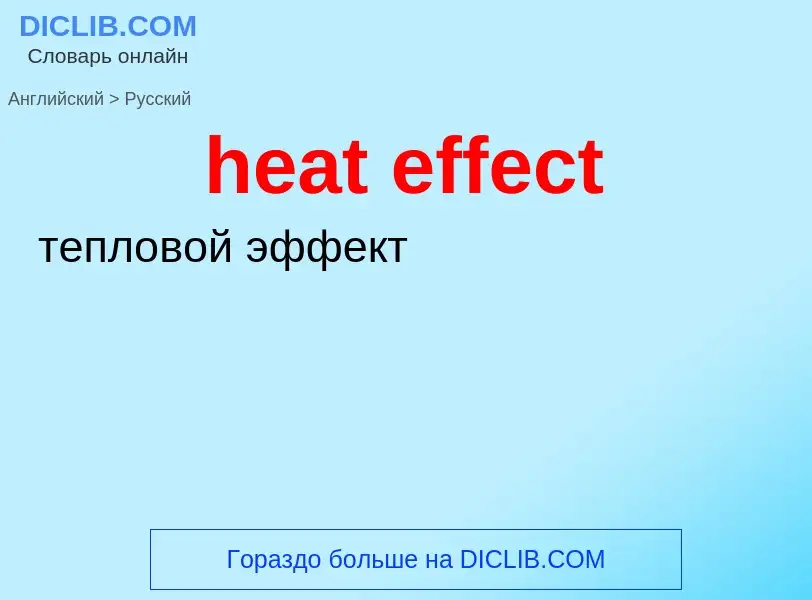Übersetzung und Analyse von Wörtern durch künstliche Intelligenz ChatGPT
Auf dieser Seite erhalten Sie eine detaillierte Analyse eines Wortes oder einer Phrase mithilfe der besten heute verfügbaren Technologie der künstlichen Intelligenz:
- wie das Wort verwendet wird
- Häufigkeit der Nutzung
- es wird häufiger in mündlicher oder schriftlicher Rede verwendet
- Wortübersetzungsoptionen
- Anwendungsbeispiele (mehrere Phrasen mit Übersetzung)
- Etymologie
heat effect - Übersetzung nach russisch
['hi:tailənd]
специальный термин
«тепловой остров» (зона, где выделение тепла выше, чем в прилегающих районах)
Definition
Wikipedia

An urban heat island (UHI) is an urban area that is significantly warmer than its surrounding rural areas due to human activities. The temperature difference is usually larger at night than during the day, and is most apparent when winds are weak. UHI is most noticeable during the summer and winter. The main cause of the UHI effect is from the modification of land surfaces. A study has shown that heat islands can be affected by proximity to different types of land cover, so that proximity to barren land causes urban land to become hotter and proximity to vegetation makes it cooler. Waste heat generated by energy usage is a secondary contributor. As a population center grows, it tends to expand its area and increase its average temperature. The term heat island is also used; the term can be used to refer to any area that is relatively hotter than the surrounding, but generally refers to human-disturbed areas.
Monthly rainfall is greater downwind of cities, partially due to the UHI. Increases in heat within urban centers increases the length of growing seasons and decreases the occurrence of weak tornadoes. The UHI decreases air quality by increasing the production of pollutants such as ozone, and decreases water quality as warmer waters flow into area streams and put stress on their ecosystems.
Not all cities have a distinct urban heat island, and the heat island characteristics depend strongly on the background climate of the area in which the city is located. Effects within a city can vary significantly depending on local environmental conditions. Heat can be reduced by tree cover and green space, which act as sources of shade and promote evaporative cooling. Other options include green roofs, passive daytime radiative cooling applications, and the use of lighter-colored surfaces and less absorptive building materials in urban areas, to reflect more sunlight and absorb less heat.
Climate change is not the cause of urban heat islands but it is causing more frequent and more intense heat waves which in turn amplify the urban heat island effect in cities.: 993 Compact, dense urban development may increase the urban heat island effect, leading to higher temperatures and increased exposure.


![Atlanta, Georgia]], showing temperature distribution, with blue showing cool temperatures, red warm, and hot areas appear white. Atlanta, Georgia]], showing temperature distribution, with blue showing cool temperatures, red warm, and hot areas appear white.](https://commons.wikimedia.org/wiki/Special:FilePath/Atlanta thermal.jpg?width=200)
![Example of urbanization: [[Dubai]] Example of urbanization: [[Dubai]]](https://commons.wikimedia.org/wiki/Special:FilePath/Dubai skyline 2015 (crop).jpg?width=200)
![[[Tokyo]], an example of an urban heat island. Normal temperatures of Tokyo go up higher than those of the surrounding area. [[Tokyo]], an example of an urban heat island. Normal temperatures of Tokyo go up higher than those of the surrounding area.](https://commons.wikimedia.org/wiki/Special:FilePath/HeatIsland Kanto en.png?width=200)
![Example of dense urban living: High-rise buildings of [[Manhattan]] during sunset Example of dense urban living: High-rise buildings of [[Manhattan]] during sunset](https://commons.wikimedia.org/wiki/Special:FilePath/High-rise buildings of Manhattan during sunset.jpg?width=200)

![Grassed tramway track]] in Belgrade, Serbia Grassed tramway track]] in Belgrade, Serbia](https://commons.wikimedia.org/wiki/Special:FilePath/Tramvaj br. 2.jpg?width=200)




![radiation]]. radiation]].](https://commons.wikimedia.org/wiki/Special:FilePath/Hot metalwork.jpg?width=200)
